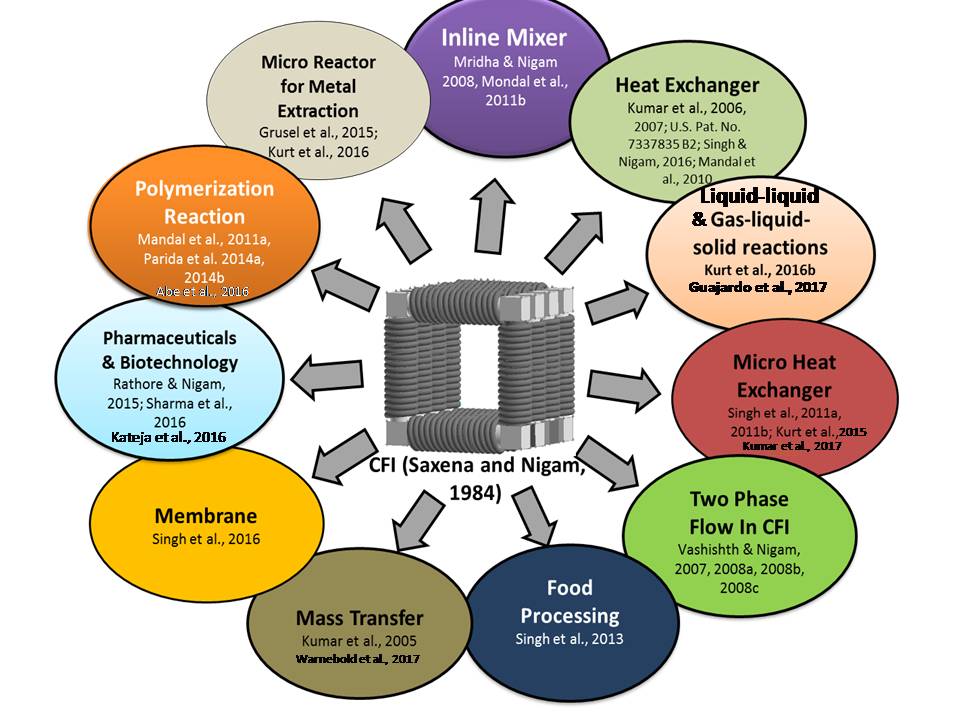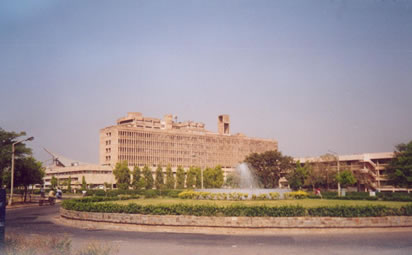|
The creation of knowledge and its effective transfer to users is our cherished mission. We are working in
the areas of Multiphase reactors particularly Trickle-Bed Reactor,bubble/Slurry bubble column reactors,
Motionless mixers etc. In this era of globalization there is a growing awareness that environment
protection and economic development must go together.
Prof. Nigam has published more than hundred research papers in international journals. Recently, he has
published a book titled 'Three phase sparged reactors', Gordon and Breach, 1996, in association with
Prof. A. Schumpe (Germany). The high impact and significance of Prof. Nigam's work can be judged from
the extensive citations it has received in research literature, research monographs, Perry's handbook of
Chemical Engineers and textbooks. His students (graduate and undergraduate) have won various
national awards such as CSIR young scientist award, best paper award of IIChE and INAE Innovative
students Projects award (B.Tech).
He has served as a member of Scientific Advisory Committee of Ministry of Petroleum & Natural Gas,
Government of India. He is also a member of different Research Advisory Committees such as Fertilizers
Association of India, Engineers India Limited, Indian Oil Corporation Limited and Regional Research
Laboratories of CSIR. He had also served as honourable Council Member of All India Council of
Technical Education, GOI. Prof. Nigam's international reputation has brought him the various Fellowships
from prestigious international organizations such as Alexander von Humbolt Foundation, Deutscher
Akademischer Austauschdienst, British Council, French Government, Cambridge University (U.K),
University of Saskatchewan, Canada and Rensselaer Polytechnic Institute, Troy. He has large numbers of
research cooperation with prestigious foreign institutions.
Prof. Nigam is researching several promising possibilities to develop a cleaner and greener technology
for trickle bed reactors. A novel reactor configuration for the countercurrent operation of trickle bed reactor
has been proposed. The pressure drop is lower and liquid holdup is higher increasing the overall
performance of the reactor due to improved wetting of the catalyst. Trickle bed reactor mostly operates
under prewetted conditions; there is very little possibility that contact angle difference will play a role there.
The reasons for the hysteresis is that while retracting, the edges of the liquid rivulets, which flow down the
porous solid packing are held up by the pores of the packing and are not allowed to retract. While
advancing, there is no such barrier and on the contrary these pores will help in spreading. An innovative
experimental setup has been designed, which is simple and easy to fabricate called as Sliding Tackle to
Counter Pinning. This equipment can be used to measure pinning forces, which are very difficult to
measure otherwise, which will be of immense use in petroleum refining industries where porous catalyst
is the heart of the technology development.
He is very actively involved in the academia and industry interaction for the energy conservation in Fertilizer
industry. He has proposed an innovative design of heat exchanger called as 'Coiled Flow Inverter' based
on novel concept of flow inversion. The proposed innovative device has potential for the multi-functional
applications in the process industry such as, inline mixer, chemical reactors, separation process, and
cryogenic applications.
He has also introduced a new class of Static mixers 'Four Zone Axial Mixers'. These mixers intend to
homogenize feed streams subject to variations in concentration or temperature. A general design
approximates the axial mixing performance of a CSTR without need for moving parts. The residence time
distribution closely approximates an exponential distribution. The devices do very little mixing in the radial
direction and thus behave like a completely segregated stirred tank. They may be used advantageously in
series with a conventional static mixer.
Trickle Bed Reactors
http://www.scopus.com/term/analyzer.url?sid=B422AE506F04289675BD2FD314A38F20.CnvicAmOODVwpVrjSeqQ%3a520&origin=resultslist&src=s&s=KEY%28trickle+bed+reactor%29&sort=plf-f&sdt=b&sot=b&sl=24&count=1052&analyzeResults=Analyze+results&txGid=B422AE506F04289675BD2FD314A38F20.CnvicAmOODVwpVrjSeqQ%3a58

Coiled Flow Inverter:A Novel Device for Process
Intensification
Another problem industry faces is with mixing at low Reynolds
numbers; we have been looking into different inline mixers and
have developed a novel inline mixer named as “COILED FLOW
INVERTER” (CFI) whose performance is practically of Plug Flow.
This property of the device provides potential to be exploited
for many applications not only in process industry but also in
other fields. We have shown the superiority of CFI with
respect to conventional inline mixers & heat exchangers. Some
schools in Europe (ECPM Strasbourg, TU Dortmund and TU
Eindhoven) have started working on our CFI device for
polymerization & extraction processes. We are also engaged in
demystifying the physics of fluid flow in complex three
dimensional flows using CFD, RTD and other modeling&
simulation tools.
The developed CFI device at IIT Delhi has received
global attention including German company Bayer for following
applications in process industry.

Different Application Areas of CFI
Green Technology
The development of Environmental friendly Technology for the
removal of Heavy metals from Spent Catalyst obtained from
Fertilizer & Petroleum refining industries. The developed
chelation technology for metal extraction at our school have
also been now applied for recovery of metals from electronic
waste.
In order to achieve above goals considerable efforts were
placed to generate research funds and createfacilities
including the construction of a three storied building
which housed the following facilities:
(i)
Pilot plant facility to test coiled flow inverter as
heat exchanger
(ii)
Pilot plant facility for trickle bed reactor operating
upto 40 atms and 1200C
(iii)
State of art laboratory for spent catalysis (GCMS, TGA,
BET,TOC and BOM CALORIMETER)
(iv) High pressure & high temperature bubble column
reactor
(iv) Computational facilities for CFD modelling & simulation
|




